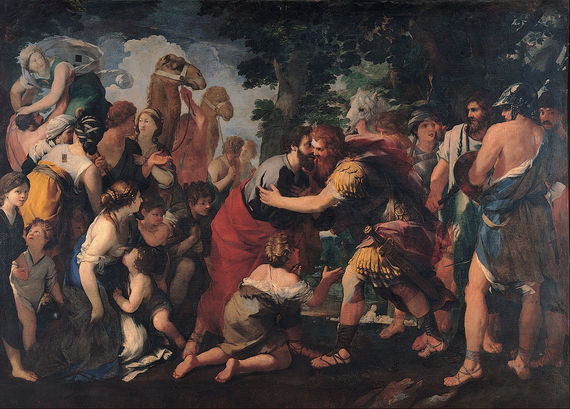From their births, our forefather Jacob (later called Israel) and his twin brother Esau are opposed characterological emblems.
"The lads grew up - and Esau became a man skilled in hunting, a man of the open field; and Jacob was an innocent man, dwelling in tents." (Genesis 25:27)
Through millennia of Jewish lore - as Esau and his nation, Edom, became ciphers for Rome, the dominant world power, hegemon and then destroyer of Jerusalem - the innocence and inwardness of Jacob was valorized in its own specific way, a paradigm of bookish sensibilities for a Jewish people not often in the position of wielding military force.
Biblical precedent lent validity to suspicion of strength and preference for gentle, spiritual ways. The Prophet Obadiah, for example - in the reading paired with our story of Jacob and Esau in the Torah this week - condemned Edom for haughtiness of might:
"Thus said the Eternal One my God, concerning Edom: I will make you least among nations, you shall be most despised. Your arrogant heart has seduced you, you who dwell in clefts of the rock, in your lofty abode. You think in your heart, "Who can pull me down to earth?" Should you nest as high as the eagle, should your eyrie be lodged among the stars, even from there I will pull you down, declares the Eternal One ... For your violence to your brother Jacob, disgrace shall engulf you, and you shall perish forever." (Obadaiah 1:2-10)
On the other hand, even as rabbinic Jewish interpretive tradition developed gentle, tent-dwelling, non-hunter, Jacob-Israel into a paragon of studious nonviolence, a certain self-knowledge, self-aware, not to say self-loathing emerged in midrash as well, with its own rebuke - self-rebuke, and even condemnation, placed in the mouth of the Divine, no less:
"Rabbi Judah bar Simon opened with the verse, 'A righteous man submitting to the wicked is like a fountain that gets muddied, or a spring that becomes polluted' (Proverbs 25:26). A truly righteous man will not remain in submission before the wicked any more than a fountain will remain muddied or a spring will remain polluted. Nevertheless, when a righteous man does submit to the wicked, he is like a muddied fountain or a polluted spring for that time. Hence the Blessed Holy One rebuked Jacob, saying: Esau was going his own way, and you sent messengers submissively toward him, saying 'Thus says your servant, Jacob!' (Genesis 32)" (Genesis Rabbah 75:1-3)
Similarly, and even more dire:
"When Jacob called Esau 'My lord' (Genesis 33:8), the Blessed Holy One said to Jacob: Eight times you have abased yourself in calling him 'my lord.' As you live, I will raise up eight kings out of his descendants who will rule before yours, as it is said, 'These are the kings that reigned in the land of Edom, before there reigned any king of the children of Israel' (Genesis 36:31)" (Genesis Rabbah 75:11)
So what is the solution? What is the solution, especially considering how Esau remains roundly caricatured and condemned throughout our Jewish religious legacy as a boor and brute and an unthinking tyrant? What is the solution, as we sometimes criticize ourselves for excessive submission, for being Jacob to a fault? What is it we must do? What must we do, especially in a time when, wondrously, and in a manner unaccustomed, the children of Israel are endowed with the instruments of war and self-defense, and Jacob's children in the diaspora are party to the government of the mightiest power on earth. How must we be?
The answer cannot be that we are to become Esau. That would be a betrayal of our Torah, of our tradition, of ourselves.
Instead, the answer must be that we must manage to project wisdom in our strength. We should not be seduced by the allure of power and brashness (allure especially for those long-victimized) as ends in themselves. If power and self-confidence, on the other hand, can be coupled with and deployed, and withheld, as situations warrant, in accord with all the learning, all the spirit, all the wisdom we have accrued through our centuries of being Jacob - of being the children of Israel, being ourselves - then there may be hope.

